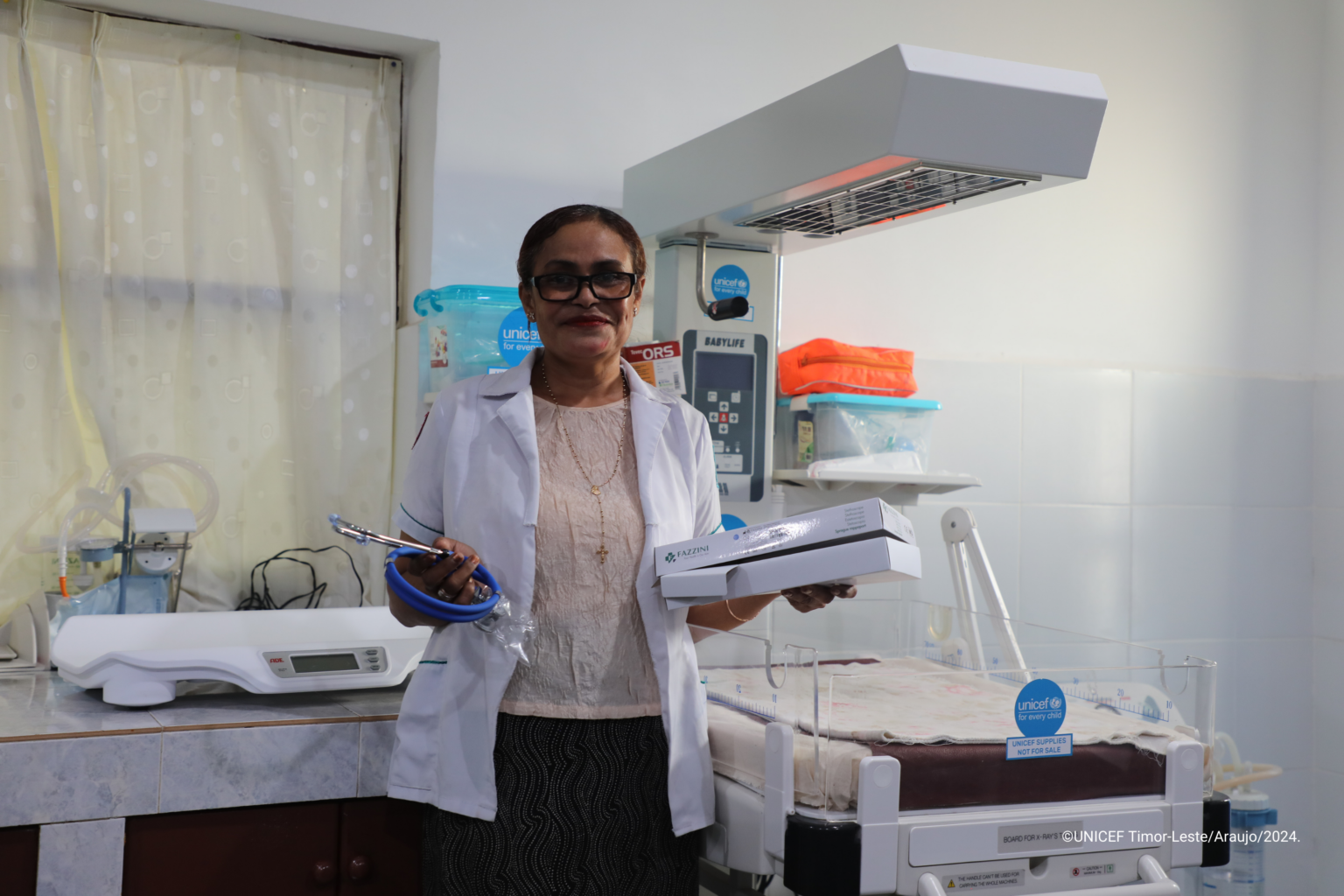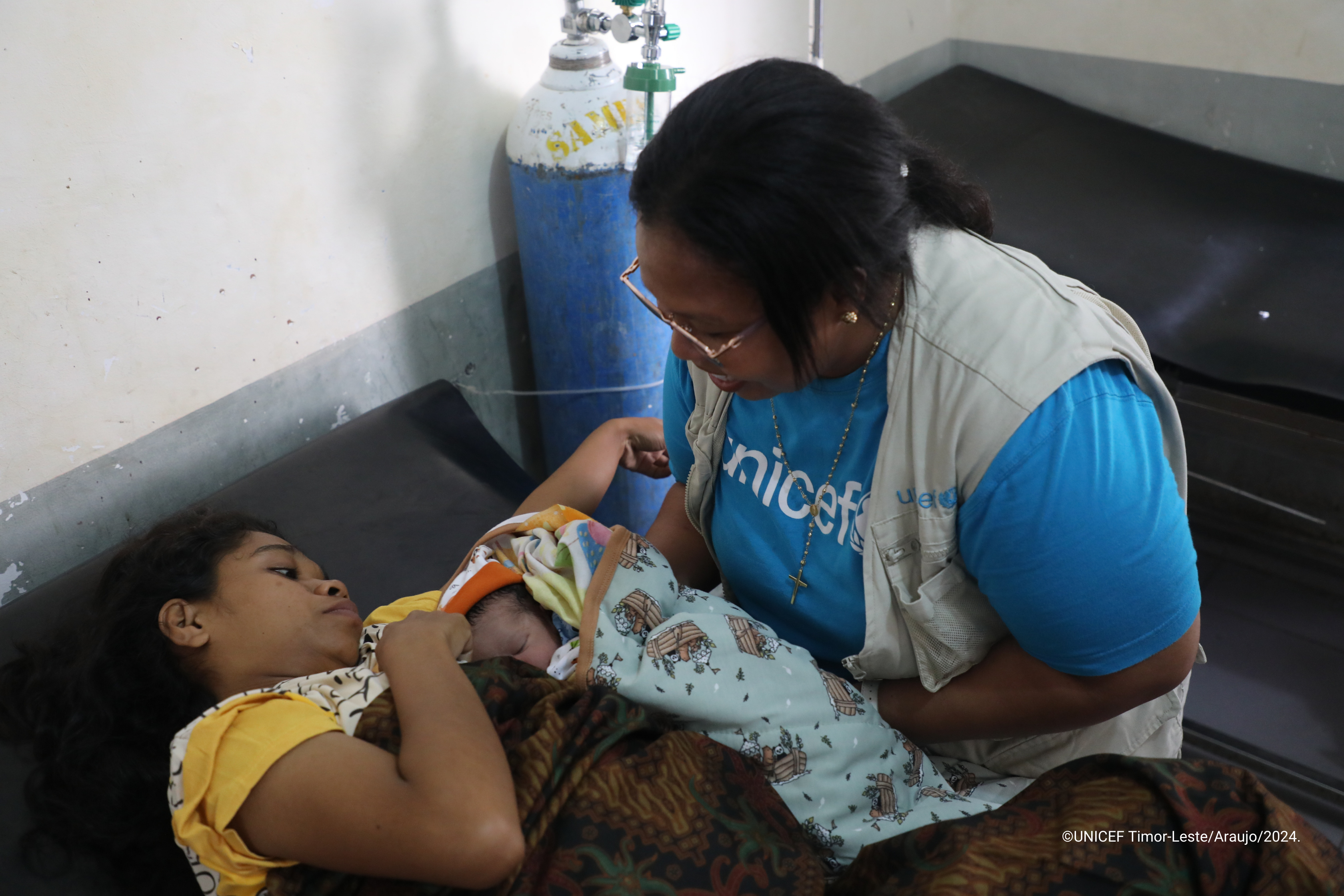UNICEF – Timor-Leste
Child Survival Program
Timor-Leste can be a difficult and dangerous place to be a pregnant woman or a newborn child.
One in 20 children do not live to see their fifth birthday, and nearly half ( 46 per cent) of these deaths happen in a child’s first month of life, mostly from preventable causes.
Only half of all mothers in Timor-Leste give birth in a health facility. Barriers include inability to access or travel to a facility, and the expense of private health-care.
Additionally, many operating health facilities lack quality services for labour and delivery (or perinatal and neonatal support).
Malnutrition, child mortality, poor maternal health and hygiene practices, and limited access to water and sanitation affect many families across Timor-Leste.
Only 57% of Timorese citizens have access to basic sanitation. With data collection and transparency issues in the health system, the real toll of maternal and newborn health in Timor-Leste may in fact be higher.
Supporting children – strategically and sustainably
Timor-Leste is a country of 1.3 million citizens, 46% of whom are aged under 18 years.
It is a nation deeply committed to peace and greater prosperity for all its people, in particular for East Timorese children and adolescents.
The Timor-Leste Child Survival program starts at the very beginning – in utero and at birth –with the aim to reduce Timor-Leste’s high perinatal death rates. The program works to strengthen health system capacity to deliver quality maternal, perinatal and neonatal healthcare and introduces new data gathering and accountability mechanisms to monitor perinatal deaths nationwide.
This program combines practical action on the ground, with work to improve the response of Timor Leste’s health system overall. In this way, we embed the progress we make and sow the seeds of lasting change.
Through UNICEF’s work in Timor-Leste, Twice the Doctor
Foundation can help to provide
the building blocks of
progress for a struggling health system.
46% – Almost half of documented child deaths (under five years old) are newborns, and almost entirely from preventable and readily treatable causes. In Timor-Leste, one in every twenty children won’t live to see their 5th birthday.
1 in 2 – Timorese children under 5 have stunted growth – risking irreversible physical and cognitive impairment with flow-on effects for wellbeing and productivity across lifetimes.
50% of Timor-Leste’s Health Posts (village level health facilities) and 40% of the larger Community Health Clinics have no access to water. Less than 50% of pregnant women gives birth at any sort of health facility.
Impact
This program saves infant lives in the here and now with better healthcare practices in better healthcare facilities – including with adequate water supply. It strengthens health workforce capacity and institutes new data collection and quality improvement systems, providing real-time evidence to track our progress and inform continuing work in this
space.
In the last year alone, we’re proud to say that the program has achieved:
– Trained 20 health staff to build their skill sets and knowledge in emergency obstetric and newborn care, and 20 health staff in safe and clean birth practices.
– Supported the operations of 86 Maternal Support Groups. Maternal Support Groups are made up of generous volunteers like Odette who addrses shortages of skilled healthcare and nutrition workers in Timor-Leste.
– Worked with local NGO Timor Aid to develop modules that will teach Maternal Support Groups on the rights of children with disabilities, early detection and referral, and how to reduce barriers to accessing health services.
– Trained 70 health workers ( 40 women and 30 men) and 618 Maternal Support Group members ( 483 women and 135 men) from Ainaro and Viqueque in infant and young child feeding practices.
– Assisted the Ministry of Health to develop the first perinatal death report in Timor-Leste, based on data from hospitals
and health facilities between 2020 and 2021. This report gives the government, UNICEF and other service providers a sound
understanding of the causes of high rates of perinatal death in Timor-Leste so the most impactful interventions can be actioned to prevent these deaths.


UNICEF’s response
For this program, UNICEF is working with the Ministry of Health, WHO and the United Nations Population Fund to introduce equality assurance approaches to Timor-Leste’s maternal and child health sector and to improve conditions at community-level health facilites. Specific activities include:
Training healthcare workers in maternal and newborn care, emergency obstetrics and infant/young child feeding practices.
Perinatal death audits to improve the evidence base and data. By understanding the causes of perinatal deaths in Timor-Leste, the health system can identify appropriate interventions, changes in practice and areas for capacity building.
Supporting the operation of Maternal Support Groups which are trained to provide health and nutrition information and support to local families, including information and support to local families, treating children who are sick, accessing maternal healthcare, sanitation and hygiene in the home, and family nutrition.
These groups help to address shortages of skilled healthcare and nutrition workers in Timor-Leste.
Improving WASH (Water, Sanitation and Hygiene facilities) at
Community Health Posts in the three target municipalities, and developing national standards for WASH at all health facilities
across Timor-Leste.
A Note from Tony Stuart, CEO, UNICEF Australia
“Twice the Doctor Foundation is working with UNICEF to give Australian doctors like you the chance to double your impact as health workers. “
